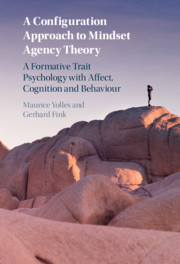 A Configuration Approach to Mindset Agency Theory
A Configuration Approach to Mindset Agency Theory from Part V - Conclusion
Published online by Cambridge University Press: 28 July 2021
This book delivers a general living system theory of personality psychology for complex agencies. It has defined and explored the formative traits, accumulated into Mindsets, that are able to explain agency behaviour. These traits are both agency and personality formative, the personality being subject to sociocultural traits that create an immanent agency context that may overlay personality orientations. Through Agency Theory they can be used to explain the rise of the dark personality ‘local’ traits like Machiavellianism, Narcissism, and Psychopathy, as well as other forms of pathology, and can also be used to explain identities and their pathologies and distortions. Since traits are value based, they are therefore stable, but they are always subject to a potential for change, that is they are essentially dynamic. While attention to the trait dynamics has centred on the cultural trait due to the extensive work in this area by Pitrim Sorokin (1939), all traits are susceptible to their own dynamics. It is therefore tempting to consider a theory referring to the internal dynamics of agency personality psychology systems might be best described by the term psychodynamics.
To save this book to your Kindle, first ensure no-reply@cambridge.org is added to your Approved Personal Document E-mail List under your Personal Document Settings on the Manage Your Content and Devices page of your Amazon account. Then enter the ‘name’ part of your Kindle email address below. Find out more about saving to your Kindle.
Note you can select to save to either the @free.kindle.com or @kindle.com variations. ‘@free.kindle.com’ emails are free but can only be saved to your device when it is connected to wi-fi. ‘@kindle.com’ emails can be delivered even when you are not connected to wi-fi, but note that service fees apply.
Find out more about the Kindle Personal Document Service.
To save content items to your account, please confirm that you agree to abide by our usage policies. If this is the first time you use this feature, you will be asked to authorise Cambridge Core to connect with your account. Find out more about saving content to Dropbox.
To save content items to your account, please confirm that you agree to abide by our usage policies. If this is the first time you use this feature, you will be asked to authorise Cambridge Core to connect with your account. Find out more about saving content to Google Drive.